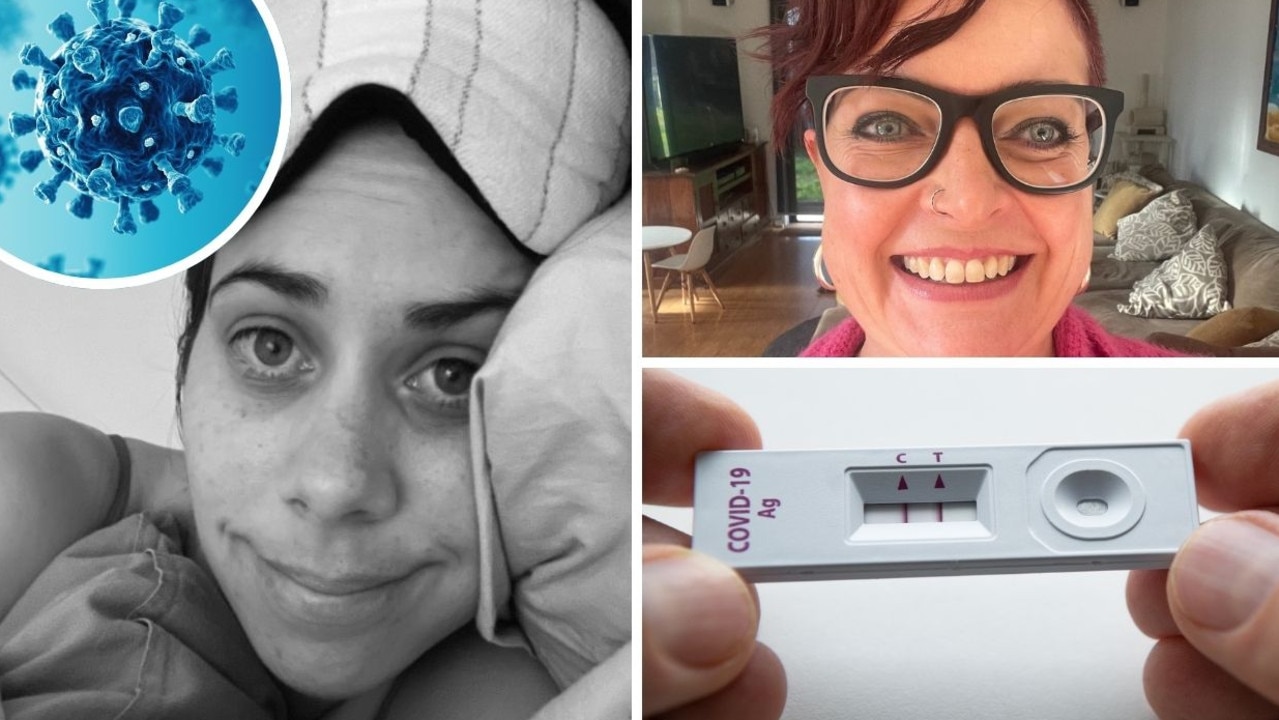Covid: Australia hits new vaccine milestone, NSW records 1405 cases as new freedoms revealed
Scott Morrison has defended his Pfizer deal and revealed Australia’s new vaccine milestone after NSW recorded 1405 new cases and revealed new freedoms for the double-jabbed.
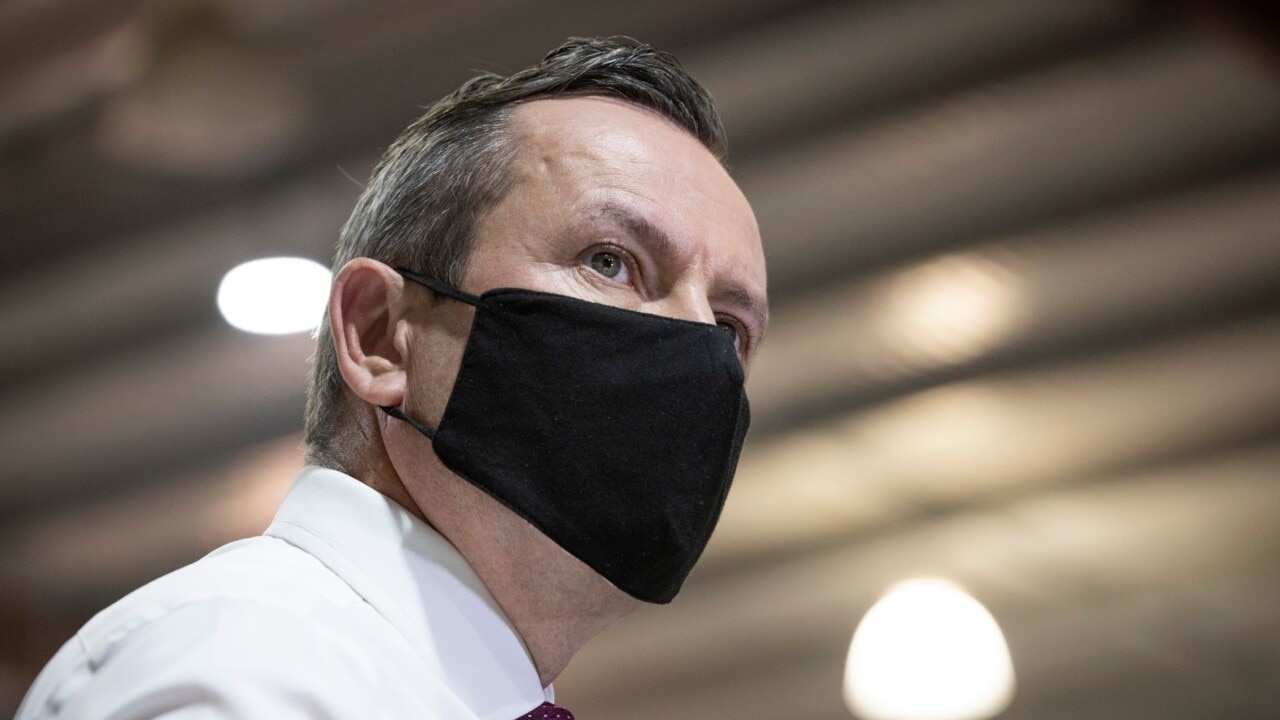
Coronavirus
Don't miss out on the headlines from Coronavirus. Followed categories will be added to My News.
Prime Minister Scott Morrison has said Australia has gone past the halfway mark in its vaccination rollout, with 40 per cent of the population double vaccinated who are over 16
He said 90 per cent of Australians aged over 70 have had their first dose.
And this week two in three Australians, right around the country aged over 16 would have had their first dose.
He also said he had been advised by General Frewen that by mid-October we will have had sufficient supplies delivered to Australia that would have enabled first and second doses for the Australian eligible population.
Mr Morrison went on to welcome the New South Wales plan to reopen.
“This plan keeps the deal, keeps the faith, with the people of Australia and the people of New South Wales set out in the national plan,” he said.
“This plan supports the initiatives that are there being driven by the safe process of opening underwritten by the Doherty modelling and supported by the national plan. It is a careful and a safe plan and consistent with everything set out in the national plan, and I commend the New South Wales government for following through.
“The discussions I and been having with the Victorian Premier and others over some weeks now, both states in strong lockdowns, moving forward on the basis of the national plan and increasing levels of vaccination in both states.”

When asked about the Pfizer email scandal leaked by Labor, he said Health Minister Greg Hunt followed the normal processes.
He said there were many different vaccine options at the time and none of them had any guarantee of certainty.
“We pursued sovereign manufacturing vaccine options for Australia,” he said.
“That was the priority that was recommended to us, of course, by our health advisors and they were the opportunities that we pursued. And having that home-grown advantage, we believe, would give us greater protection.”
He said it was one of many vaccine engagements Australia had at the time.
“So we went to the arrangements that we entered into with AstraZeneca to make it here in Australia, well over 10 million of those vaccines have now been administered here,” he said.
“Had we not done that, then you would have seen the vaccination rates in Australia half what they are today.
“And you would have seen those particularly elderly Australians not as protected as they have been -- have been, particularly as we’ve gone into these latest waves of the Delta strain of the virus. Those other countries went through emergency approval procedures for their vaccines. “Australia didn’t do that. We followed the normal process because we wanted to ensure Australians that the vaccines that we were asking them to take were safe in accordance with all the other vaccine programs that the country runs.
“So we had been engaging with them at the time but what is very clear is that what was necessary was for us to establish our own sovereign vaccine manufacturing capability, which we did.”
He said after getting extra doses from Poland, the UK and Singapore, he has “some irons in the fire” and is also working on.
Mr Morrison said he thought WA Premier Mark McGowan’s threat to leave his state shut for Christmas while others reopen as “underselling West Australians”.
“I mean I think they’ll get vaccinated sooner than that. He’s making assumptions that Western Australians won’t get vaccinated until some time in January.
“I don’t think Western Australians will be that complacent. I have a bigger thinking that they want to engage with the rest of the country and the world.
“Western Australians log out, they don’t log in. And I know Western Australians will be keen to move on and get on.
“I can understand the Premier would be having a conservative still, I can understand that, that’s prudent, but at the same time I believe they’ll be able to achieve well beyond that and it’s very important that our country lives with this virus.”
NSW RECORDS 1405 CASES; NEW FREEDOMS
It comes as New South Wales has recorded 1405 new locally acquired Covid-19 cases, as the state outlines an easing of restrictions for fully vaccinated residents.
Premier Gladys Berejiklian confirmed five deaths had been recorded in the state in the same 24-hour reporting period.
A fully vaccinated man in his 80s from an aged care facility in Penrith died at Nepean Hospital.
An unvaccinated woman in her 70s from western Sydney died at Ryde Hospital, an unvaccinated woman in her 70s from western Sydney died at Concord Repatriation General Hospital, an unvaccinated man in his 80s from south-western Sydney died at Westmead Hospital, and an unvaccinated woman in her 40s from south-western Sydney died at Liverpool History.
The state administered 107,000 vaccines on Wednesday.
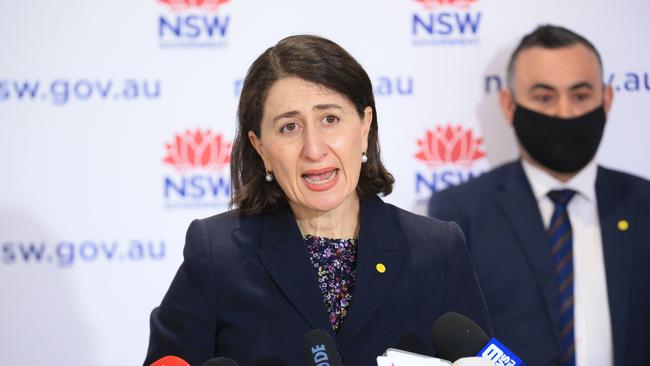
Chief health officer Kerry Chant said authorities continued to be concerned about Cumberland, Canterbury-Bankstown and Liverpool local government areas, but an upswing in cases were occuring in the Inner West, Glebe, and Waterloo.
“A callout to the communities in those areas – you may not have perceived yourself at risk, but please get tested if you have the most minimal of symptoms,” Dr Chant said.
While NSW is expected to reach its peak case numbers next week, the ramping up of the state’s vaccine rollout has meant authorities have released a roadmap to freedom.
Parts of regional NSW that have not had a new case in more than 14 days will come out of lockdown this Saturday, while the rest will look forward to eased restrictions in mid-October.
Restrictions will ease on the Monday after the state hits the 70 per cent fully vaccinated mark, including
- Up to five vaccinated adults allowed in a home, and 20 can gather in outdoor settings;
- Hospitality venues can open with one person per 4sqm inside and retail stores can reopen (unvaccinated people can only access critical retail);
- Hairdressers, nail salons, gyms and outdoor recreation facilities to open with one person per 4sqm;
- Stadiums, theme parks, cinemas, theatres, museums and galleries can reopen with one person per 4sqm
- Fifty guests permitted at funerals and weddings - dancing only permitted while seating.
VICTORIA RECORDS 324 CASES
A total of 217 new mystery Covid-19 infections have emerged in Victoria overnight after the state recorded 324 new local cases on Thursday.
Contact tracers are under pressure after just 107 of the new infections were linked to known cases and outbreaks.
Thursday’s figure is the highest since August 14 in 2020 when Victoria posted 372 new daily cases.
A total of 54,252 tests were conducted in the past 24 hours and 37,604 vaccine doses were administered.
Victoria recorded 246 new cases on Monday and Tuesday and then 221 on Wednesday.
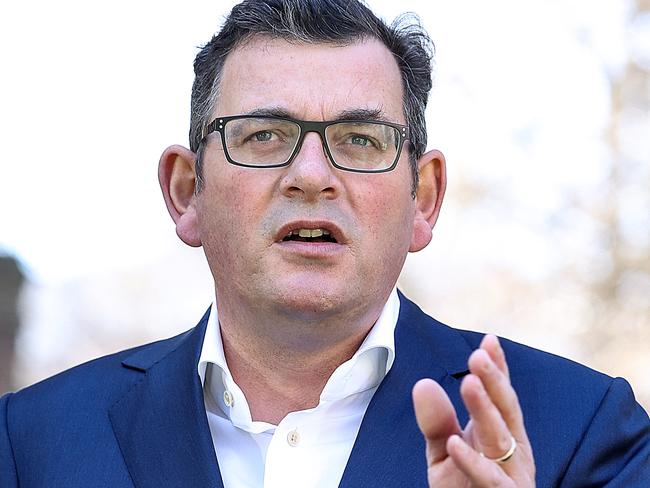
The news comes as lockdown is set be lifted in regional Victoria, except Shepparton, on Friday, with pubs and cafes to reopen and some students heading back into classrooms.
Hundreds of Victorians stranded on the border will also be able to return home and quarantine at their own properties.
Premier Daniel Andrews on Wednesday revealed low case numbers in the regions had given the government the confidence it needed to ease some significant restrictions outside Melbourne.
The five reasons to leave home in those areas will be removed from 11.59pm on Thursday.
There will be no travel limit, although regional Victorians will not be allowed to enter Melbourne except for compassionate or authorised work.
Prep to grade 2 pupils, as well as year 12 students, will return to the classroom, authorised worker permits will not be needed, and weddings and funerals will be allowed – albeit with small attendances.
Restaurants and cafes, shops, hairdressers and entertainment venues can reopen for seated service, with hospitality caps of 20 people outdoors and 10 indoors.
HUNT DEFENDS PFIZER DEAL
Federal Health Minister Greg Hunt has defended Australia’s deal Pfizer after it was revealed his office did not immediately take up a meeting with the vaccine maker after it first approached the government.
Freedom of Information documents, obtained by Labor, show Pfizer first contacted the Department of Health on 30 June 2020, requesting a formal virtual meeting with Mr Hunt to discuss the role it could play in vaccinating the country at the “earliest opportunity”.
Instead, the health department’s first assistant secretary took an “introductory” meeting with the company about 10 days later. No one from the health minister’s office met with Pfizer until August.
A deal between Australia and Pfizer – for only 10 million doses – was not signed until November.
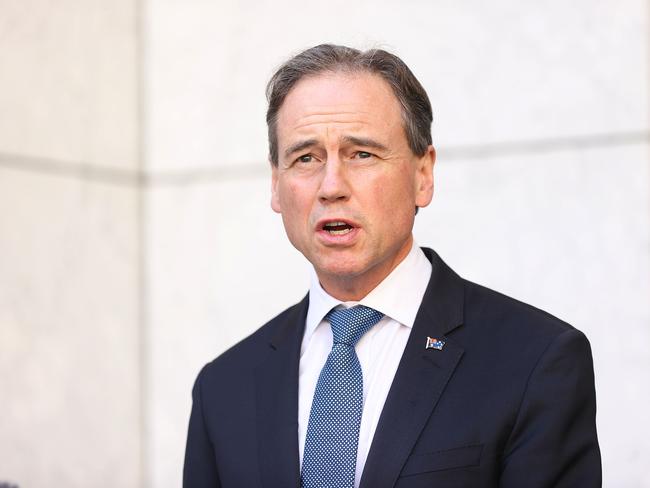
Mr Hunt appeared on the Today show on Thursday and said “we engaged” with the pharmaceutical giant from May 2020 onwards.
“[Our] Pfizer … arrived at the same time as New Zealand, the same shipment in February [this year],” Mr Hunt told today.
“There were no earlier doses available. That’s a myth being put out by Labor.”
He claimed the first Pfizer jabs arrived in Australia at the earliest possible day “in the quantities that they made available.”
“That’s because, understandably, they were focusing on mass death in the countries where they were producing,” he said.
“It is precisely because we knew that, that we set up – in record speed – a sovereign domestic manufacturing program for AstraZeneca … we secured everything we could at the earliest possible time.
Australia’s slow vaccine rollout has been blamed for the current NSW, Victoria and ACT lockdowns, and the country’s lagging vaccination rates, with just over 35 per cent of the eligible population having received both doses.
The documents show that Pfizer urged the federal government last year to sign a deal as soon as possible, so that “millions of doses” could be supplied in 2020. No Pfizer doses arrived in Australia until February 2021.
The Opposition said it showed a “deliberate wait and see approach” to vaccine deals which meant Australia started its vaccination push a lap behind other OECD countries.
“Australians are paying the price of Scott Morrison’s incompetence; we have more people in lockdown and fewer people vaccinated than any other developed country,” Shadow Health Minister Mark Butler said.
Pfizer Australia first spoke to the Department of Health on June 26. Days later, in an email now publicly available, a company representative told the department that the vaccine landscape was “moving swiftly” and that Pfizer was engaging with other countries.

“I am able to make senior members of Pfizer’s global leadership team available for this discussion, particularly if the Minister and/or Departmental leadership can be involved,” the representative said.
In a letter attached to the email addressed to Mr Hunt dated June 30, a Pfizer representative said the company had “the potential to supply millions vaccine doses by the end of 2020” which would rapidly scale up to “produce hundreds of millions of doses in 2021”.
First Assistant Secretary in the Health Department Lisa Schofield responded to Pfizer’s emails three days later, confirming she – not Minister Hunt as requested – would meet with Pfizer on Friday, July 10.
The next correspondence from Pfizer was the following Monday, when an offer was made for high-ranking members Pfizer to meet virtually with senior government officials to discuss a detailed vaccine rollout plan, if the government signed a confidential disclosure agreement.
If the government was not willing to sign the agreement, Pfizer said they would accept an “exploratory/ introductory meeting” for the time being.

A Pfizer representative followed up with another email to Ms Schofield the following day, urging the First Assistant Secretary to take up a 90-minute meeting with Pfizer to run through a “lengthy and highly detailed slide deck” which went into the scientific development and clinical trial process, as well as information on vaccine technology, manufacturing, supply chain, and procurement processes.
The representative said the slide deck could not be emailed, so required a virtual meeting.
Ms Schofield rejected the offer for a detailed meeting as the confidentiality disclosure agreement was still being finalised, and instead agreed to the introductory/exploratory discussion.
“It is not usual practice for the Commonwealth to sign such documents (as the confidential disclosure agreement) as we are covered by various legislative requirements …,” Ms Schofield said.
During the meeting on July 10, notes reveal Pfizer wanted to have discussions to “move as quickly as possible”, so that their vaccines could be deployed “at unprecedented speed”.
Pfizer also disclosed how many doses they could possibly have by the end of the year, but the figure has been redacted by the government.
The notes say that Pfizer wanted to know a timeline for doses, and what the Australian Technical Advisory Group on Immunisation’s (ATAGI) approval process was.
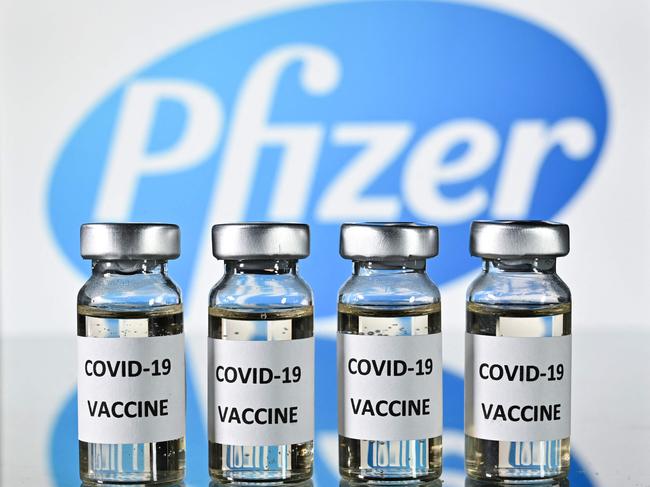
Almost two weeks later, Pfizer Australia followed up with the health department noting the UK and the US had signed deals for vaccine supply.
At this stage, the confidentiality disclosure agreement was still being negotiated to allow for senior members of Pfizer Global to meet with the government.
It wasn’t until August 4, 2020, that anyone from the health minister’s office met with Pfizer.
There were later meetings but those details have been redacted.
Australia signed a deal with Pfizer for just 10 million doses in November 2020.
Prime Minister Scott Morrison did not speak to Pfizer’s global chief until July 2021.
The FOI decision has also revealed the government was “refusing” to release two sets of advice it received in relation to Pfizer’s vaccines in July 2020.
Mr Hunt has been contacted for comment.
- Anthony Piovesan, Catie McLeod
Read related topics:Scott Morrison




